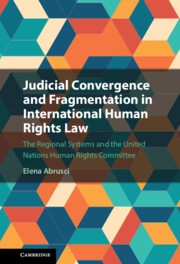 Judicial Convergence and Fragmentation in International Human Rights Law
Judicial Convergence and Fragmentation in International Human Rights Law Book contents
- Judicial Convergence and Fragmentation in International Human Rights Law
- Judicial Convergence and Fragmentation in International Human Rights Law
- Copyright page
- Contents
- Figures
- Tables
- Foreword
- Acknowledgements
- Table of Cases
- Abbreviations
- Introduction
- Part I Introducing and Assessing Fragmentation and Convergence in International Human Rights Law
- 1 Fragmentation and Convergence
- 2 Assessing and Exploring Judicial Fragmentation in International Human Rights Law
- Part II Factors Explaining Judicial Convergence and Fragmentation
- Conclusions
- Book part
- Index
2 - Assessing and Exploring Judicial Fragmentation in International Human Rights Law
from Part I - Introducing and Assessing Fragmentation and Convergence in International Human Rights Law
Published online by Cambridge University Press: 22 December 2022
- Judicial Convergence and Fragmentation in International Human Rights Law
- Judicial Convergence and Fragmentation in International Human Rights Law
- Copyright page
- Contents
- Figures
- Tables
- Foreword
- Acknowledgements
- Table of Cases
- Abbreviations
- Introduction
- Part I Introducing and Assessing Fragmentation and Convergence in International Human Rights Law
- 1 Fragmentation and Convergence
- 2 Assessing and Exploring Judicial Fragmentation in International Human Rights Law
- Part II Factors Explaining Judicial Convergence and Fragmentation
- Conclusions
- Book part
- Index
Summary
This chapter offers an assessment of judicial fragmentation in international human rights law. The first part of the chapter presents a comparative analysis of the case-law of the three regional systems and the UN Human Rights Committee on rights that are the highly susceptible to trigger fragmentation, either for the relevance of religious, cultural and political concerns or for the vagueness of some terms in the norms’ provisions that could possibly allow very different interpretations. As this analysis shows a substantial convergence or absence of fragmentation, the second part of the chapter focuses on the detailed analysis of the few cases of judicial fragmentation identified, exploring their features in depth. They include case-law on freedom to wear religious attire, indigenous rights and the right to marry for same-sex couples.
- Type
- Chapter
- Information
- Judicial Convergence and Fragmentation in International Human Rights LawThe Regional Systems and the United Nations Human Rights Committee, pp. 42 - 94Publisher: Cambridge University PressPrint publication year: 2023
